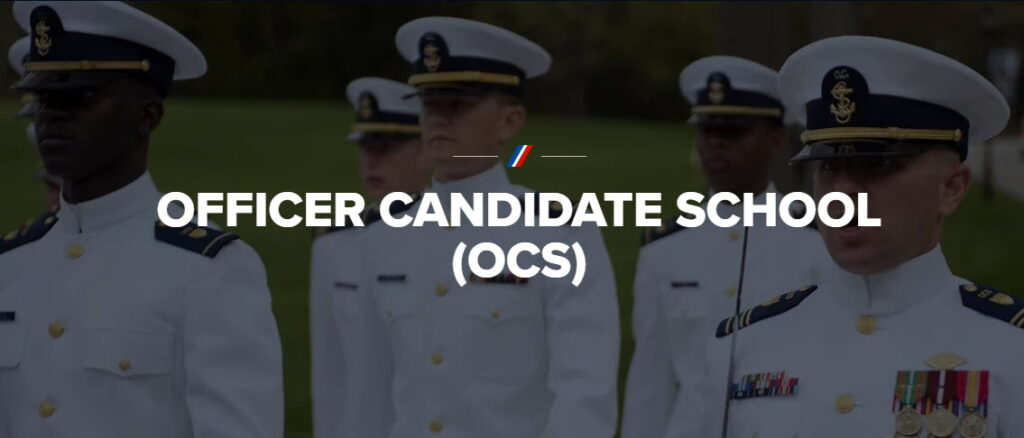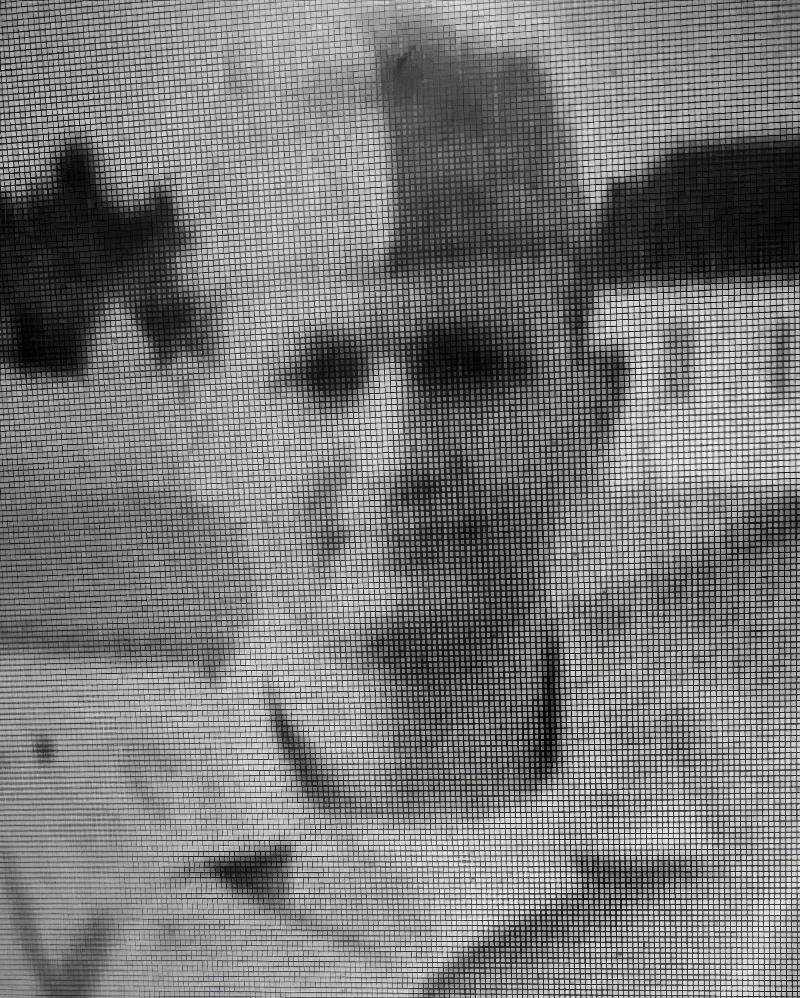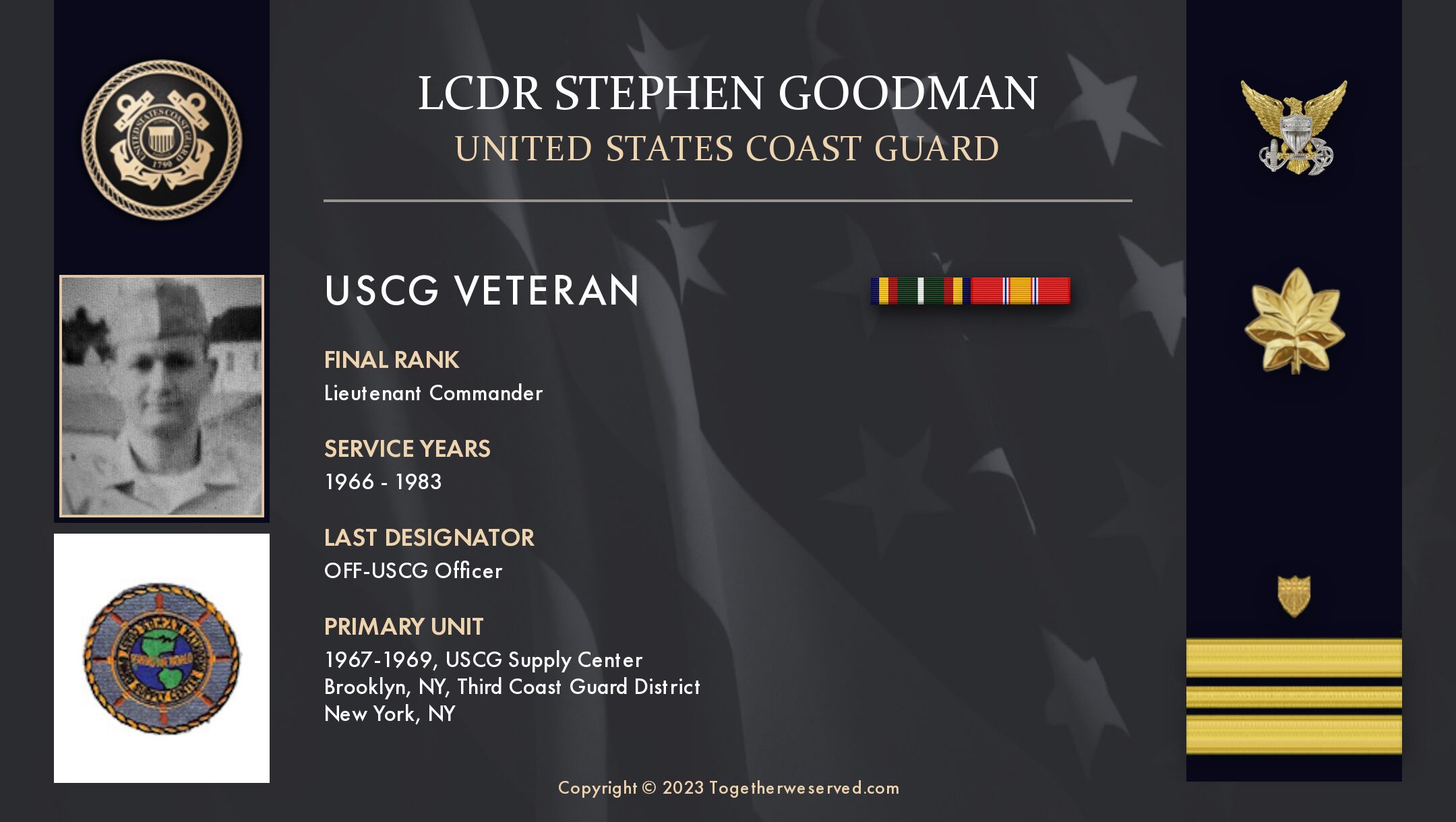PRESERVING A MILITARY LEGACY FOR FUTURE GENERATIONS
The following Reflections represents LCDR Stephen Goodman’s legacy of his military service from 1966 to 1983. If you are a Veteran, consider preserving a record of your own military service, including your memories and photographs, on Togetherweserved.com (TWS), the leading archive of living military history. The following Service Reflections is an easy-to-complete self-interview, located on your TWS Military Service Page, which enables you to remember key people and events from your military service and the impact they made on your life. Start recording your own Military Memories HERE.
Please describe who or what influenced your decision to join the Coast Guard.

It was the autumn of 1965, and I was at my first job after graduating from college in May. I was in a Wall Street training program with about five others who were preparing for the securities industry exams to become registered. One of the other trainees was biding his time as he had been accepted by the Navy for OCS and planned to go to Newport in the coming spring. We talked a lot about the different branches of service, and he tried to convince me to apply for Navy OCS. This was as we were approaching the height of the Vietnam War; all my friends were searching for reserve units that would accept them to avoid being drafted. Three friends joined the Coast Guard Reserve and found themselves together at boot camp in Cape May. I preferred to serve as an officer, and so I considered the officer candidate opportunities available. I have always loved the water, so I reduced it to the Navy or Coast Guard. One day in late 1965, during lunchtime, I walked from work to the US Customs House in lower Manhattan, where the Coast Guard District Office was. I spoke with a young officer about the Coast Guard’s mission and was given a brochure and the OCS application paperwork to take home.
I attended NYU graduate business school to obtain my MBA degree and was still classified 2-S, but I knew that would soon change to 1-A as the monthly draft calls were increasing. (This was before the lottery began in 1969.) I completed and delivered the OCS application back to the Coast Guard. I visited with Army, Navy, and Air Force recruiters about applying to their branch OCS. A few months later, I received my acceptance notice from the Coast Guard, and soon after that, I enlisted and entered OCS in September 1966.
Whether you were in the service for several years or as a career, please describe the direction or path you took. What was your reason for leaving?

A few weeks before graduating from OCS in Yorktown. Virginia, I received orders to report after graduation to the CGC Half Moon, which was performing Ocean Station Bravo duty in the North Atlantic. The week after graduation, the Coast Guard announced that 5 cutters (including the Half Moon) were being deployed to Vietnam for Operation Market Time. However, three days before graduation, because an academy Lieutenant had just resigned, I received new orders to be his replacement at the Coast Guard’s Supply Center.
I served 18 months as the Chief of the Materials Handling Division, responsible for the entire warehouse, servicing all the sea and land units of the Coast Guard. I then served as the Chief Administrative Officer of the Supply Center. After three years of active duty, I served in the Coast Guard Reserve for an additional 14 years.
If you participated in any military operations, including combat, humanitarian and peacekeeping operations, please describe those which made a lasting impact on you and, if life-changing, in what way?

A significant operation my unit participated in was named Combat Aid. This was a project to construct and supply a LORAN station in Vietnam that was to assist our Air Force in its missions there. The project took about a year from start to finish. I clearly remember the very exciting day that everything was loaded from our supply center to be flown to the in-country construction site.
Of all your duty stations or assignments, which one do you have fondest memories of and why? Which was your least favorite?

During my active duty, I was stationed at the Coast Guard Supply Center for my entire active duty. Although it was physically located within the 3rd CG District, this was a ‘Headquarters Unit’ and was responsible directly to CG Headquarters in Washington, DC. Its mission was to serve and supply all of the ships and shore facilities of the entire US Coast Guard located within the US and throughout the world. Within this unit was the Coast Guard’s crystal manufacturing facility, where we made crystals for the various communications equipment used by the CG worldwide.
From your entire military service, describe any memories you still reflect back on to this day.

I recall how, as a young Ensign right out of OCS, I was given the responsibility as the officer in charge of the main supply center’s warehouse for the entire Coast Guard, servicing our ships and shore stations around the world. It was a 5 story warehouse in which 65 civilians worked with 25 enlisted personnel. Looking through a rearview mirror at this assignment, I am amazed at the responsibility I was given. I am thankful for the opportunity to learn management skills that otherwise would have taken many years to master.
Of all the medals, awards, formal presentations and qualification badges you received, or other memorabilia, which one is the most meaningful to you and why?

Our unit received the Coast Guard Unit Commendation award for the excellent work we performed for ordering, receiving, staging (in Brooklyn), and shipping of an entire Loran station that was constructed in Vietnam; its initial purpose was to assist the US Air Force in Vietnam.
Which individual(s) from your time in the military stand out as having the most positive impact on you and why?

Captain Dono W Moore was our commanding officer; Commander Al Landry was our executive officer. Both of these officers were excellent leaders and guided us to successfully lead and manage our team of personnel.
List the names of old friends you served with, at which locations, and recount what you remember most about them. Indicate those you are already in touch with and those you would like to make contact with.

All from the USCG Supply Center:
LTjg John Lenker
LTjg Richard Ur
LT Bruce Lauther
LTjg Kurt Roessner
LTjg Richard Moore
LT Richard Spence
I would like to reconnect with John Lenker. Through TWS, I connected by email with Richard Ur. They were both stationed at the Supply Center during the time I was there. I would also like to reconnect with fellow Bravo-2 classmates from OCS class 01-67.
What profession did you follow after your military service, and what are you doing now? If you are currently serving, what is your present occupational specialty?

I was released from active duty at the end of August 1969 and joined a reserve unit on Governor’s Island. I remained in the Reserves for 14 additional years. Upon my RELAD, I worked for a financial public relations firm on Wall Street, representing clients to institutional and retail registered representatives. About a year later, I was offered an opportunity in the finance department of a small public electronics company; several years later, I was promoted to be the Treasurer (now commonly known as the CFO).
Several years later, I moved to California, obtained a real estate broker license, and founded a small finance company, providing funding to small and medium-sized businesses. In the early and mid-1990s, the use of pagers to communicate with friends and business associates took off. Along with two business associates, we formed a company that became a major distributor of paging devices in the San Francisco Bay Area. This led to our introduction to the wireless sector of the burgeoning communications industry. We obtained licenses from the FCC and built several high-speed wireless systems to support the growth of the Internet in the early years of the 21st century. The company became a publicly traded entity with about 1200 shareholders.
What military associations are you a member of, if any? What specific benefits do you derive from your memberships?

American Legion – past commander of Post 128 in Arizona.
American Legon – a member of Post 264 in California.
Retired member of the US Coast Guard Auxiliary.
In what ways has serving in the military influenced the way you have approached your life and your career? What do you miss most about your time in the service?

I truly enjoyed my three years of active duty, as I was fortunate to have been assigned to a position that enabled me to gain managerial experience that prepared me for the world of business I entered after my RELAD.
Based on your own experiences, what advice would you give to those who have recently joined the Coast Guard?

Don’t look for ‘shortcuts’ to get your assignments completed. Invest as much time as you can to study, learn new skills, and to advance in your chosen field. Find a mentor who will assist and guide you to succeed; then trust your mentor!
In what ways has togetherweserved.com helped you remember your military service and the friends you served with.

TWS has caused and enabled me to reflect upon my three years of active duty. I recall the various challenges and accomplishments I was fortunate to be a part of, as well as some opportunities that I missed.
PRESERVE YOUR OWN SERVICE MEMORIES!
Boot Camp, Units, Combat Operations
Join Togetherweserved.com to Create a Legacy of Your Service
U.S. Marine Corps, U.S. Navy, U.S. Air Force, U.S. Army, U.S. Coast Guard

0 Comments